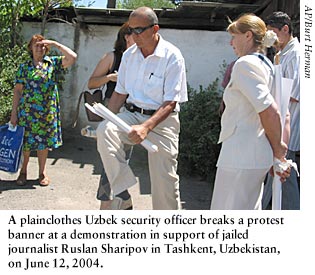Attacks on the Press 2006: Countries That Have Jailed Journalists
ALGERIA: 2 Djamel Eddine Fahassi, Alger Chaîne III IMPRISONED: May 6, 1995 Fahassi, a reporter for the state-run radio station Alger Chaîne III and a contributor to several Algerian newspapers, including the now-banned weekly of the Islamic Salvation Front, Al-Forqane, was abducted near his home in the al-Harrache suburb of the capital, Algiers, by four…
Attacks on the Press 2005: Countries That Have Jailed Journalists (Follow Links for More Details)
AFGHANISTAN: 1 Ali Mohaqqiq Nasab, Haqooq-i-Zan (Women’s Rights) Imprisoned: October 1, 2005 The attorney general ordered editor Nasab’s arrest on blasphemy charges after the religious adviser to President Hamid Karzai, Mohaiuddin Baluch, filed a complaint about his magazine. “I took the two magazines and spoke to the Supreme Court chief, who wrote to the attorney…
Attacks on the Press 2004: Europe and Central Asia Analysis
Overview by Alex Lupis Authoriatarian rulers strengthened their hold on power in many former Soviet republics in 2004. Their secretive, centralized governments aggressively suppressed all forms of independent activity, from journalism and human rights monitoring to religious activism and political opposition.
Attacks on the Press 2004: Uzbekistan
UzbekistanUzbekistan’s stagnant economy and Soviet-style dictatorship continued to fuel popular discontent in 2004, and President Islam Karimov brutally suppressed dissenters to -maintain his control of the country. Karimov stonewalled U.S. and Western pressure for reforms throughout the year, cultivating his image as an American ally in the “war on -terror” and calculating that the Bush…

Persecuted journalist granted asylum in the U.S.
New York, October 26, 2004—Ruslan Sharipov, an independent journalist and human rights activist who was persecuted, tortured and imprisoned by Uzbek authorities, has resettled in California after gaining political refugee status in the United States. In an interview with the Committee to Protect Journalists yesterday, Sharipov said he is excited to “taste freedom again” and…
A journalist released, but struggling
New York, August 4, 2004—Uzbek authorities have released Madzid Abduraimov, a journalist with the national weekly Yangi Asr, who was imprisoned for three years after criticizing authorities in the southern Surkhandarya region. Abduraimov said he is struggling now to reclaim his home and other personal belongings that were confiscated by authorities. “Being in prison was…
Imprisoned journalist transferred to house arrest
March 17, 2004, New York—Uzbek authorities have allowed imprisoned journalist Ruslan Sharipov, who has been jailed since May 2003, to complete his sentence under house arrest. On Friday, March 12, the Uzbek Foreign Ministry announced that Sharipov would be moved from Tavaksay Prison in Tashkent Region to a low-security prison near Kibray District, also in…
Attacks on the Press 2003: Europe and Central Asia Analysis
While integration into NATO and the European Union has had a positive effect on press freedom conditions in most of Central Europe and the Baltic states, the situation for journalists in Russia and the former Soviet republics has worsened steadily, with governments relying on authoritarian tactics to silence the media. Even reformist governments in the…
Attacks on the Press 2003: Uzbekistan
Increased international aid and the presence of U.S. troops using Uzbekistan as a base for the “war on terror” have focused new international attention on the country, forcing President Islam Karimov to pay lip service to press freedom. “Today, there are no boundaries to the flow of information, and any attempts to restrict freedom of…
Attacks on the Press in 2003: Journalists in Prison
There were 138 journalists in prison around the world at the end of 2003 who were jailed for practicing their profession. The number is the same as last year. An analysis of the reasons behind this is contained in the introduction on page 10. At the beginning of 2004, CPJ sent letters of inquiry to…